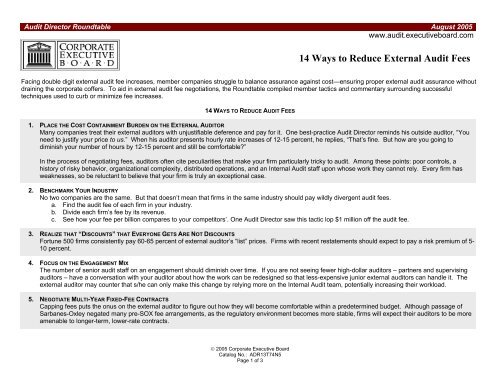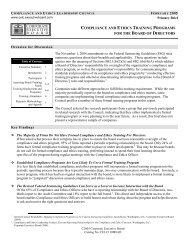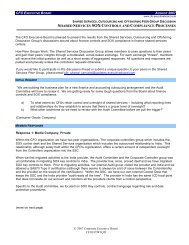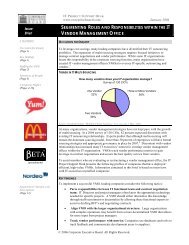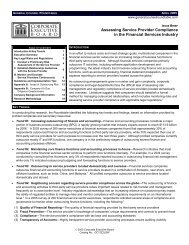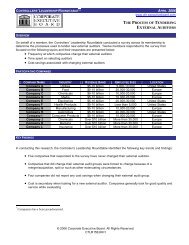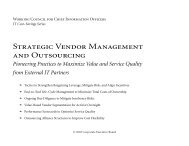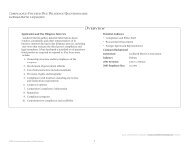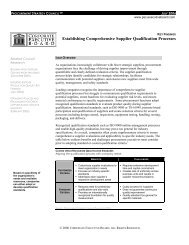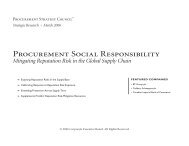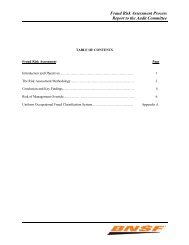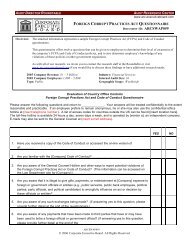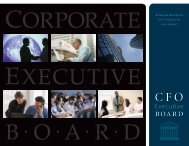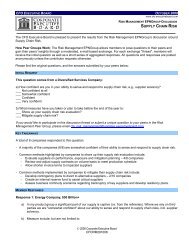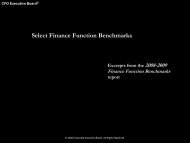14 Ways to Reduce External Audit Fees - Corporate Executive Board
14 Ways to Reduce External Audit Fees - Corporate Executive Board
14 Ways to Reduce External Audit Fees - Corporate Executive Board
Create successful ePaper yourself
Turn your PDF publications into a flip-book with our unique Google optimized e-Paper software.
<strong>Audit</strong> Direc<strong>to</strong>r Roundtable August 2005<br />
www.audit.executiveboard.com<br />
<strong>14</strong> <strong>Ways</strong> <strong>to</strong> <strong>Reduce</strong> <strong>External</strong> <strong>Audit</strong> <strong>Fees</strong><br />
Facing double digit external audit fee increases, member companies struggle <strong>to</strong> balance assurance against cost—ensuring proper external audit assurance without<br />
draining the corporate coffers. To aid in external audit fee negotiations, the Roundtable compiled member tactics and commentary surrounding successful<br />
techniques used <strong>to</strong> curb or minimize fee increases.<br />
<strong>14</strong> WAYS TO REDUCE AUDIT FEES<br />
1. PLACE THE COST CONTAINMENT BURDEN ON THE EXTERNAL AUDITOR<br />
Many companies treat their external audi<strong>to</strong>rs with unjustifiable deference and pay for it. One best-practice <strong>Audit</strong> Direc<strong>to</strong>r reminds his outside audi<strong>to</strong>r, “You<br />
need <strong>to</strong> justify your price <strong>to</strong> us.” When his audi<strong>to</strong>r presents hourly rate increases of 12-15 percent, he replies, “That’s fine. But how are you going <strong>to</strong><br />
diminish your number of hours by 12-15 percent and still be comfortable”<br />
In the process of negotiating fees, audi<strong>to</strong>rs often cite peculiarities that make your firm particularly tricky <strong>to</strong> audit. Among these points: poor controls, a<br />
his<strong>to</strong>ry of risky behavior, organizational complexity, distributed operations, and an Internal <strong>Audit</strong> staff upon whose work they cannot rely. Every firm has<br />
weaknesses, so be reluctant <strong>to</strong> believe that your firm is truly an exceptional case.<br />
2. BENCHMARK YOUR INDUSTRY<br />
No two companies are the same. But that doesn’t mean that firms in the same industry should pay wildly divergent audit fees.<br />
a. Find the audit fee of each firm in your industry.<br />
b. Divide each firm’s fee by its revenue.<br />
c. See how your fee per billion compares <strong>to</strong> your competi<strong>to</strong>rs’. One <strong>Audit</strong> Direc<strong>to</strong>r saw this tactic lop $1 million off the audit fee.<br />
3. REALIZE THAT “DISCOUNTS” THAT EVERYONE GETS ARE NOT DISCOUNTS<br />
Fortune 500 firms consistently pay 60-65 percent of external audi<strong>to</strong>r’s “list” prices. Firms with recent restatements should expect <strong>to</strong> pay a risk premium of 5-<br />
10 percent.<br />
4. FOCUS ON THE ENGAGEMENT MIX<br />
The number of senior audit staff on an engagement should diminish over time. If you are not seeing fewer high-dollar audi<strong>to</strong>rs – partners and supervising<br />
audi<strong>to</strong>rs – have a conversation with your audi<strong>to</strong>r about how the work can be redesigned so that less-expensive junior external audi<strong>to</strong>rs can handle it. The<br />
external audi<strong>to</strong>r may counter that s/he can only make this change by relying more on the Internal <strong>Audit</strong> team, potentially increasing their workload.<br />
5. NEGOTIATE MULTI-YEAR FIXED-FEE CONTRACTS<br />
Capping fees puts the onus on the external audi<strong>to</strong>r <strong>to</strong> figure out how they will become comfortable within a predetermined budget. Although passage of<br />
Sarbanes-Oxley negated many pre-SOX fee arrangements, as the regula<strong>to</strong>ry environment becomes more stable, firms will expect their audi<strong>to</strong>rs <strong>to</strong> be more<br />
amenable <strong>to</strong> longer-term, lower-rate contracts.<br />
© 2005 <strong>Corporate</strong> <strong>Executive</strong> <strong>Board</strong><br />
Catalog No.: ADR13T74N5<br />
Page 1 of 3
<strong>Audit</strong> Direc<strong>to</strong>r Roundtable August 2005<br />
<strong>14</strong> <strong>Ways</strong> <strong>to</strong> <strong>Reduce</strong> <strong>External</strong> <strong>Audit</strong> <strong>Fees</strong> www.audit.executiveboard.com<br />
<strong>14</strong> WAY TO REDUCE AUDIT FEES (CONTINUED)<br />
6. WIELD A HIDDEN HAMMER<br />
In negotiation, there is no substitute for the ability <strong>to</strong> walk away. Realize that audi<strong>to</strong>rs create lock-in by entangling themselves with your organization. Since<br />
so few firms switch audit firms in any given year, external audi<strong>to</strong>rs are fighting for a fixed pie, which should drive prices downward but for audi<strong>to</strong>r lock-in<br />
costs.<br />
Firms estimate that they could save 20-40 percent of their fee by switching audi<strong>to</strong>rs. Past experience backs this up: of the seven Fortune 500 companies<br />
whose fees have actually gone down since 2000, five have switched audi<strong>to</strong>rs during that span.<br />
7. MAKE THE AUDIT DIRECTOR THE “BAD COP”<br />
The <strong>Audit</strong> Direc<strong>to</strong>r should begin audit fee negotiations, trying <strong>to</strong> get the best price possible. Then the <strong>Audit</strong> Committee should strive <strong>to</strong> drive the price down<br />
a bit more. One <strong>Audit</strong> Direc<strong>to</strong>r remarked, “It’s good cop, bad cop… and we’re the bad cop…. At the end, ask them, ‘Do you have adequate resources <strong>to</strong> get<br />
the job done’ They’ll let you know if they really can’t do it.”<br />
8. EXPLOIT PARTNER DISCRETION<br />
Even deep in<strong>to</strong> the negotiations, the lead partner usually has the ability <strong>to</strong> give the fee a “haircut” – sometimes <strong>to</strong> the tune of $500,000.<br />
9. OPTIMIZE INTERNAL AUDIT<br />
Since paying your own people is cheaper than paying their people, Internal <strong>Audit</strong> should handle a higher fraction of <strong>to</strong>tal audit work each year. If this<br />
percentage is not growing, ask your external audi<strong>to</strong>r what process improvements they believe would increase their ability <strong>to</strong> rely on Internal <strong>Audit</strong>’s work.<br />
10. UNDERSTAND FEE DRIVERS<br />
Always strive <strong>to</strong> better understand what’s driving fee levels. In addition <strong>to</strong> pure revenue-driven fees, some drivers we’ve heard from the membership are:<br />
a. Centralized manufacturers with a distribution network pay less – relative <strong>to</strong> revenue – than firms with far-flung operations.<br />
b. Firms with operations in fewer nations save themselves the hassle of having <strong>to</strong> work with numerous partners.<br />
c. Conservative accounting policies – particularly in judgment accounts – reduce external audit’s risk and work. (If you have a conservative accounting<br />
policy, you’re already paying for it on your income statement; don’t pay for it again with your audit fees.)<br />
11. KNOW THE ECONOMICS OF FEES<br />
Hourly rates and requisite hours drive fees. But what drives hourly rates and requisite hours Hourly rates are a function of supply and demand for audi<strong>to</strong>rs,<br />
inflationary pressures, and partners’ expected year-end profit sharing. Requisite hours are a function of more controllable variables: your audi<strong>to</strong>r’s reliance<br />
on your work, and year-over-year efficiencies in testing.<br />
12. ELIMINATE REDUNDANCY<br />
Absent compelling rationale, do not have both internal and external team auditing the same process. Review your internal and external audit plans <strong>to</strong><br />
ensure that the two teams do not pick the same tree twice.<br />
© 2005 <strong>Corporate</strong> <strong>Executive</strong> <strong>Board</strong><br />
Catalog No.: ADR13T74N5<br />
Page 2 of 3
<strong>Audit</strong> Direc<strong>to</strong>r Roundtable August 2005<br />
<strong>14</strong> <strong>Ways</strong> <strong>to</strong> <strong>Reduce</strong> <strong>External</strong> <strong>Audit</strong> <strong>Fees</strong> www.audit.executiveboard.com<br />
<strong>14</strong> WAYS TO REDUCE AUDIT FEES (CONTINUED)<br />
13. COMMUNICATE CONSTANTLY<br />
Firms that succeed at halting audit fees communicate. To take one example, a firm holds weekly meetings during the month before 10-Qs, and biweekly<br />
meetings the rest of the time. Present at these meetings are the lead audit partner, the <strong>Audit</strong> Direc<strong>to</strong>r, and other key company management. The partner<br />
presents: (1) what they’re working on this quarter, (2) what is on the plan for the rest of the year, and (3) which emerging issues he believes are<br />
inside/outside the fixed-fee audit scope. Management keeps the partner apprised of acquisitions, divestitures, and other audit-altering business news.<br />
<strong>14</strong>. PLAN AHEAD<br />
Have a tentative audit plan ready far in advance. The sooner you can open communication about how you can – <strong>to</strong>gether – cover the audit plan, the<br />
happier you will be when it’s time <strong>to</strong> pay the bills.<br />
Professional Services Note<br />
The <strong>Audit</strong> Direc<strong>to</strong>r Roundtable has worked <strong>to</strong> ensure the accuracy of the information it provides <strong>to</strong> its members.<br />
This project relies upon data obtained from many sources, however, and the <strong>Audit</strong> Direc<strong>to</strong>r Roundtable cannot<br />
guarantee the accuracy of the information or its analysis in all cases. Further, the <strong>Audit</strong> Direc<strong>to</strong>r Roundtable is not<br />
engaged in rendering legal, accounting or other professional services. Its projects should not be construed as<br />
professional advice on any particular set of facts or circumstances. Members requiring such services are advised <strong>to</strong><br />
consult an appropriate professional. Neither <strong>Corporate</strong> <strong>Executive</strong> <strong>Board</strong> nor its programs is responsible for any<br />
claims or losses that may arise from any errors or omissions in their reports, whether caused by <strong>Corporate</strong> <strong>Executive</strong><br />
<strong>Board</strong> or its sources.<br />
© 2005 <strong>Corporate</strong> <strong>Executive</strong> <strong>Board</strong><br />
Catalog No.: ADR13T74N5<br />
Page 3 of 3


